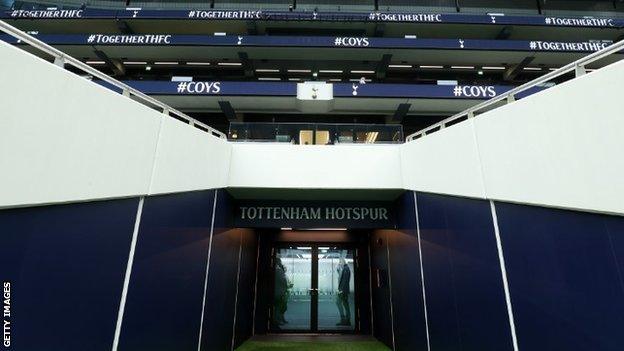Tottenham Hotspur reverse furlough decision for non-playing staff
- Published

Tottenham initially announced on 31 March they were furloughing some staff
Tottenham have reversed their decision to use the government's furlough scheme for some non-playing staff during the coronavirus crisis following criticism from supporters.
On 31 March, the club announced 550 employees would take a 20% pay cut in an attempt "to protect jobs".
But on Monday, a Spurs statement, external said non-playing staff will receive "100% of their pay for April and May".
Only board members will now take salary reductions, the statement added.
That includes chairman Daniel Levy, who earned £7m last year.
Levy said: "We regret any concern caused during an anxious time and hope the work our supporters will see us doing in the coming weeks, as our stadium takes on a whole new purpose, will make them proud of their club."
Tottenham Hotspur Supporters' Club (THST) - which had on Friday urged the club to "do the right thing" and reverse the decision, saying "mass supporter opinion against these decisions had solidified" - thanked directors "for finding an alternative way forward".
"This is the first step, but a big step, in restoring relations between fans and the club," the group added., external
Spurs' statement on Monday said: "With no clarity on when football might resume, and under what conditions, we shall continue to keep this under ongoing review.
"We are acutely aware that many supporters were against the decision we made regarding furloughing staff who could not carry out their jobs from home.
"This once again underlines that we bear different pressures to other businesses, many of whom have and will continue to apply for support from the scheme as the government intended."
The Premier League club added they would continue to consult with stakeholders and the THST, "who share our desire to protect jobs".
Spurs also announced they will become the first club in the Premier League to provide equipment at the Tottenham Hotspur Stadium for drive-through Covid-19 testing for NHS staff and their families.
Newcastle United, Bournemouth and Norwich City are among the Premier League clubs to announce they will furlough some non-playing staff.
Leaders Liverpool have already reversed their decision to place some non-playing staff on temporary leave and apologised to fans following a fierce backlash.
Analysis
Former England and Arsenal striker Ian Wright on BBC Radio 5 Live
The Tottenham Supporters' Trust have to get a lot of credit. Right from the start, they've been saying it's not right, they shouldn't be doing it and it was not right for the football club.
Tottenham are entitled to take it [furlough option] but of course it doesn't look right and it's never too late to do the right thing.
They've listened to their fans as Liverpool did and they realised the damage it could've caused and reversed it. They've realised they're wrong and in the end you have to say 'well done for doing it'.
Former Blackburn Rovers striker Chris Sutton on BBC Radio 5 Live
They have taken their time. It seems to be the pressure from the Spurs fans and the public in general. Why has there been this change? They've reversed it out of embarrassment. Why did it take so long?
With the Spurs situation, people look at the owners and they were telling us they're the eighth-richest club in the world. The truth is they have just caved in to fan and media pressure.
Their plan initially was to furlough staff and that was the wrong plan.
BBC Sport's Simon Stone on BBC Radio 5 Live
Tottenham came under intense pressure from their own fans, those wider in football and the general public over their initial decision, but this reversal has been a longer time coming than many thought.
People inside the club advised Levy that it was a bad move to start with, but it seems that sense has prevailed in the end.
This is an example of how football and footballers are maybe held up to different standards to society.
It was said at the time that companies who were of a similar size to Tottenham were using the job retention scheme that the government put in place.
But football is different. Football pays its players a lot of money, football receives a lot of money from TV - therefore there is scrutiny that other businesses just do not have.
Any club that goes down this route can understand that they will be left open to criticism.